Book contents
- Frontmatter
- Contents
- List of Contributors
- Foreword
- Acknowledgements
- Introduction
- I Theoretical and Comparative Dimensions
- II Presidential Federal Systems
- III Commonwealth Parliamentary Federations
- IV Non-Commonwealth Parliamentary Federations in Afro-Asia
- V European Parliamentary Federations
- 15 The German Federal System and its Reforms: Structures, Taboos and the ‘Shylock Principle’
- 16 The Belgian Federation: Tools of Appeasement, Instruments of Confrontation
- 17 Federalism as Ideology and as Institutional Form in the Spanish Estado de las Autonomías (1977–2004)
- VI Devolutionary Systems
- VII Supranational Confederalism/Federalism?
17 - Federalism as Ideology and as Institutional Form in the Spanish Estado de las Autonomías (1977–2004)
from V - European Parliamentary Federations
Published online by Cambridge University Press: 05 June 2012
- Frontmatter
- Contents
- List of Contributors
- Foreword
- Acknowledgements
- Introduction
- I Theoretical and Comparative Dimensions
- II Presidential Federal Systems
- III Commonwealth Parliamentary Federations
- IV Non-Commonwealth Parliamentary Federations in Afro-Asia
- V European Parliamentary Federations
- 15 The German Federal System and its Reforms: Structures, Taboos and the ‘Shylock Principle’
- 16 The Belgian Federation: Tools of Appeasement, Instruments of Confrontation
- 17 Federalism as Ideology and as Institutional Form in the Spanish Estado de las Autonomías (1977–2004)
- VI Devolutionary Systems
- VII Supranational Confederalism/Federalism?
Summary
Introduction
The enormous amount of grumbling among politicians and intellectuals in Spain over how to classify the Estado de las Autonomías (State of Autonomies) – and specifically, over whether it qualifies as a ‘federal’ state or not – might appear incomprehensible, and inconsequential to an outsider. The significance of these debates only becomes clear when they are situated within the horizons of political discourse in Spain and recognized as attempts to legitimate and/or contest existing constellations of material and social power relations. The fact that the typological debates over the nature of the Estado de las Autonomías are so hotly contested only makes sense once it is recognized that the people who espouse the different positions in this often incredibly technical and legalistic debate are simultaneously engaged in advancing competing and contradictory substantive and normative ‘stories of peoplehood’.
As a rough first approximation, it can be said that the debate about the federal or, alternatively, ‘unitary decentralized state’ has two ideological roots and political functions. One on the part of some nationalists in the periphery to question the present Constitution and Estatutos, question its legitimacy since it has not been enacted by agreement of original independent units – nations – seeking a federation. Indirectly it is a way to argue for de facto independence ending in some loose confederation, since independence may not be feasible. The other ideological position is that the present asymmetrical federalism creates privileges and tension and that federalism – a la U.S.A. – would lead to an equal treatment of all the component units.
- Type
- Chapter
- Information
- Varieties of Federal GovernanceMajor Contemporary Models, pp. 378 - 430Publisher: Foundation BooksPrint publication year: 2011

